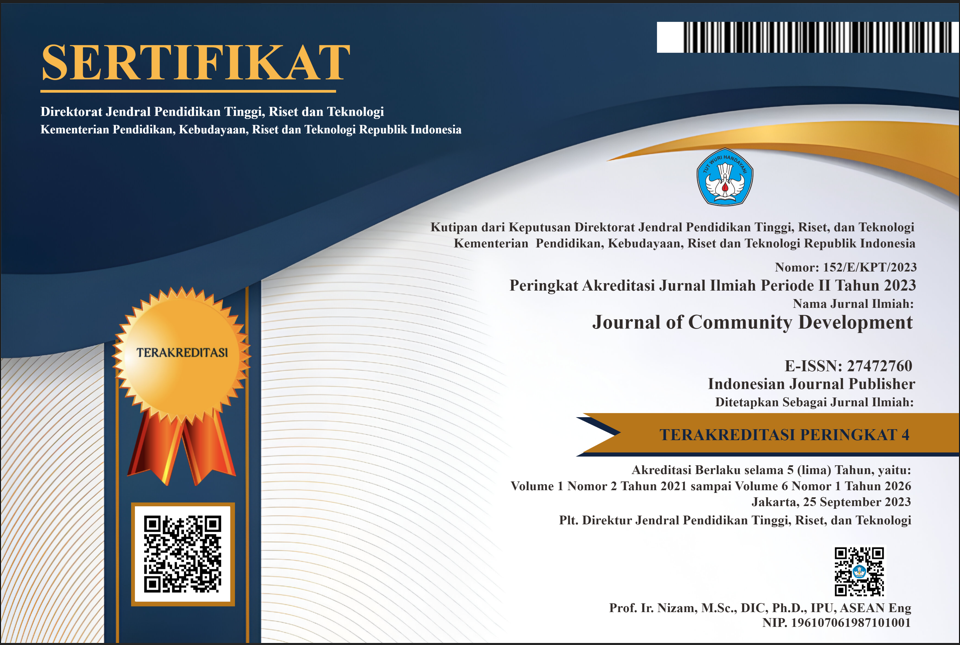Identifikasi Kendala Yang Dialami Guru Dalam Menyusun Alur Tujuan Pembelajaran
DOI:
https://doi.org/10.47134/comdev.v5i2.263Keywords:
phase B, Kurikulum Merdeka, learning objectivesAbstract
The implementation of the Independent Curriculum (IKM) at the basic education level is divided into three stages of learning outcomes, namely phase A, phase B, and phase C. The flow of learning objectives (ATP) is a new way as a "syllabus", namely for planning, setting learning and assessment in outline according to the characteristics and competencies developed by each subject at the end of each phase. This form of service is carried out in collaboration with SD Muhammadiyah Kaliwates (SD HAMKA), which is one of the educational business charities of Muhammadiyah which has only been established for 3 years in Jember. By using participatory assistance methods, implementation is carried out in 4 stages, namely needs mapping, pumped group discussions with experts, mentoring and evaluation. During the pumped group discussion, it was known that there were obstacles in the implementation of activities. First, the implementation of IKM in classes 1 and 2 only, while class 3 still uses K13. The 3rd grade teacher hasn't understood yet. Second, SD HAMKA has not appointed grade 4 teachers as partners for grade 3 teachers in formulating ATP in phase B. This makes it difficult for grade 3 teachers to develop ATP. The third obstacle, teachers experience limited time and means to complete ATP development.
Downloads
References
Clementine Umuhoza, A. U. (Dec 2021). Teacher’s Use of Instructional Materials in Teaching and Learning Mathematics in Rwandan Primary Schools. African Journal of Teacher Education.
Egan, J. P. (2020). Beyond the afterglow: Effective transfer of learning through instructional design. Teaching & Learning Inquiry: The ISSOTL Journal.
ELIZABETH WARREN, L. T. (2011). Engaging Indigenous children in . International Journal of Pedagogies and Learning, 97–107.
Irfan Irfan, M. A.-R.-P. (2022). IMPLEMENTATION OF PROJECT-BASED LEARNING (PjBL) ON IPAS LEARNING MATERIALS IN THE MERDEKA CURRICULUM AT MUHAMADIYAH MUJAHIDDIN ELEMENTARY SCHOOL. Primary, 689-702.
Miquel Pérez Torres, D. C. (2023). Evaluation of STEAM Project-Based Learning (STEAM PBL) Instructional Designs from the STEM Practices Perspective. Education Sciences.
Nina Tarasenkova, I. A. (Aug 2022). Instructional design of mathematics and language integrated learning (MLIL) for future Mathematics teachers. Educação & Formação.
OWEN, P. M. (2007). Integrating Katz and Chard’s Project Approach with Multicultural Education. Journal of Early Childhood Teacher Education,28, 219–232,.
Pedro Ivars, C. F. (Nov 2020). Using a hypothetical learning trajectory to propose instructional activities. Enseñanza de las Ciencias.
Raharjo, M. M., & Maryati, S. (2021). Pengembangan pembelajaran. Jakarta: Pusat Kurikulum dan Perbukuan, Kementerian Pendidikan, Kebudayaan, Riset dan Teknologi.
Downloads
Published
How to Cite
Issue
Section
Categories
License
Copyright (c) 2024 Agus Prasetyo Utomo, Wahju Dyah Laksmi Wardhani, Fatchurhohman

This work is licensed under a Creative Commons Attribution 4.0 International License.







